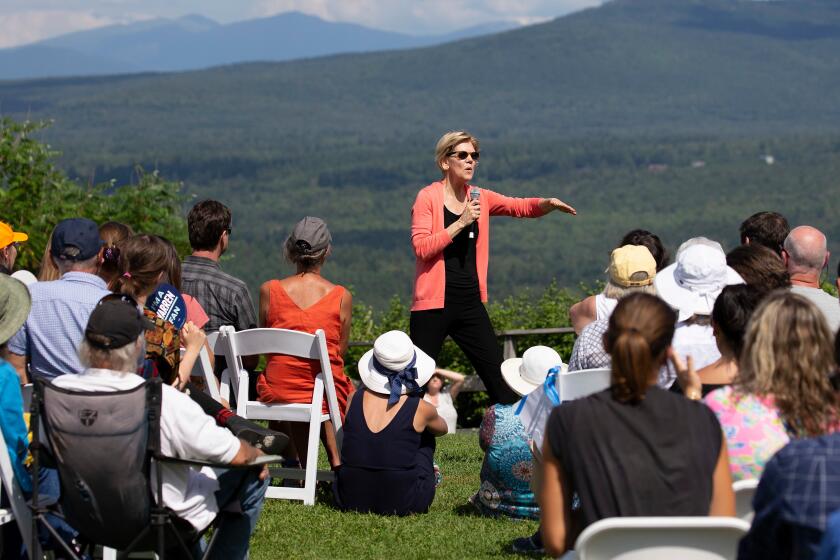Bernie Sanders’ famed $27 donors are split in 2020’s sprawling Democratic field
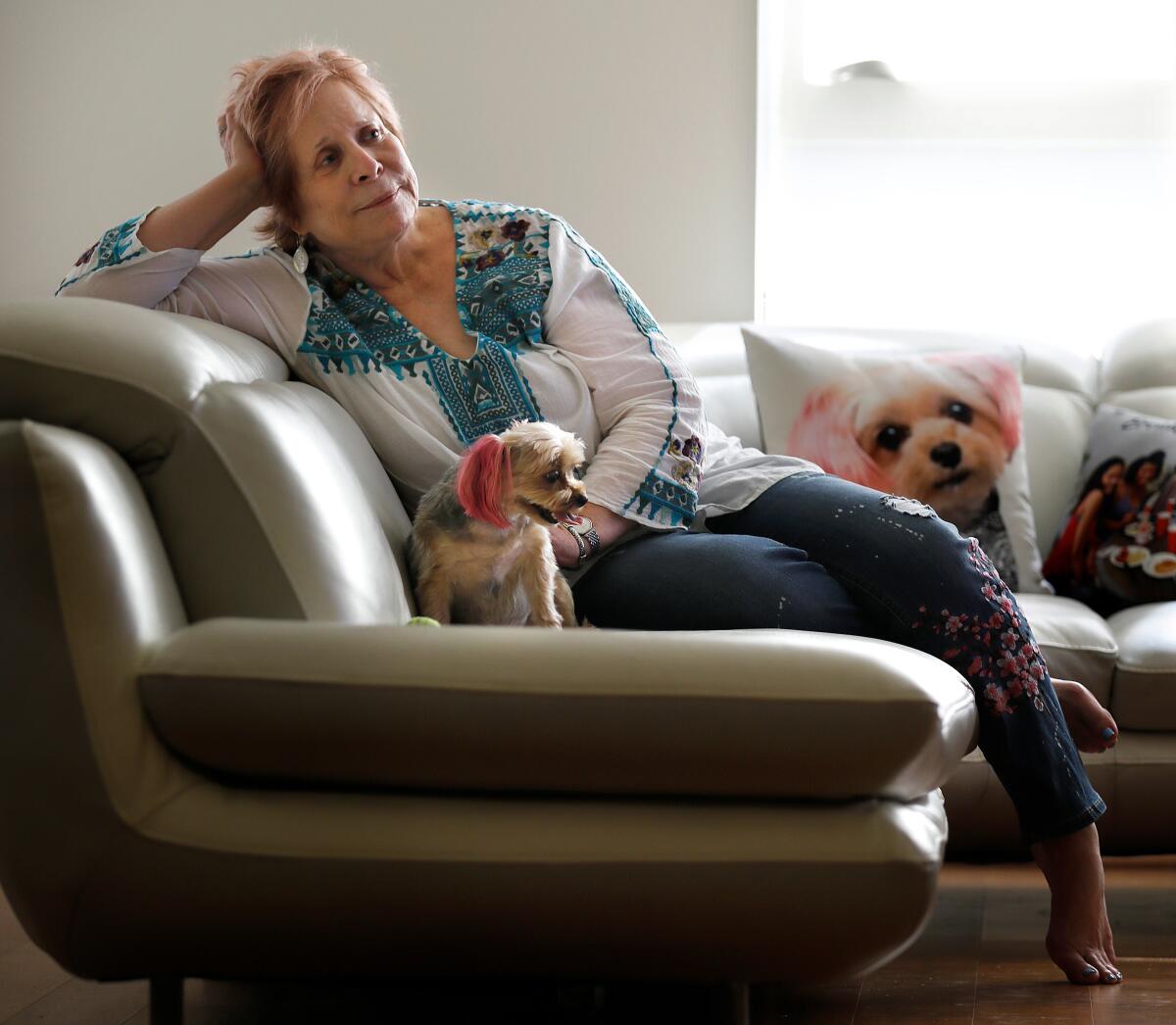
- Share via
Small-dollar donors made Bernie Sanders’ 2016 presidential bid one of the most successful insurgent campaigns in Democratic Party history, allowing him to be competitive with establishment favorite Hillary Clinton.
But in the 2020 race, nearly 1.7 million, or more than 80%, of the donors who fueled his earlier run have stayed on the sidelines, according to a Times analysis of campaign finance disclosures through June 30.
The 2016 donors who are contributing this election cycle have given more than $32 million to the Democratic field. More than $16.2 million of that went to Sanders, making up about 45% of the money he has raised. But nearly as much went to his rivals, a sign of how split Democrats are as they try to figure out the best candidate to take on President Trump.
“Bernie’s washed up. I just think he’s too old,” Audrey Tieger, 68, said of the 77-year-old Sanders.
“I don’t think he has enough crossover appeal among a whole range of incomes and experiences,” added the Los Angeles retiree who has donated to more than half a dozen presidential candidates.
The numbers need to be viewed in context: It is early. The 2016 donation figures represent 19 months of contributions, including the height of the fiery competition between Sanders and Clinton. The current numbers represent a little more than six months during the primary season’s earliest period, when less attention is focused on presidential politics. The first nominating contest — the Iowa caucuses — is six months away.
But Sanders has an enormous pool of former donors who have not yet committed whom he may be able to tap in coming months.
Florence Boos, an English professor at the University of Iowa, is one of the 2016 donors who have stayed true to Sanders. The senator’s decades-long efforts to fight for single-payer healthcare and against income inequality prove his devotion to the issues most important to her, Boos said.
“It’s very important to me that Bernie has been completely consistent over the years,” said the 75-year-old, adding that many of the policy debates now dominating the Democratic primary were first raised by Sanders when few politicians would touch them.
Boos noted that she donated to President Obama and then was disappointed by positions he took on torture, rendition and drones.
“I don’t trust candidates who haven’t lived their beliefs,” she said. Sanders “wants to change the country more than he wants to be president. If what you really want is political office, ultimately you compromise once you get the office.”
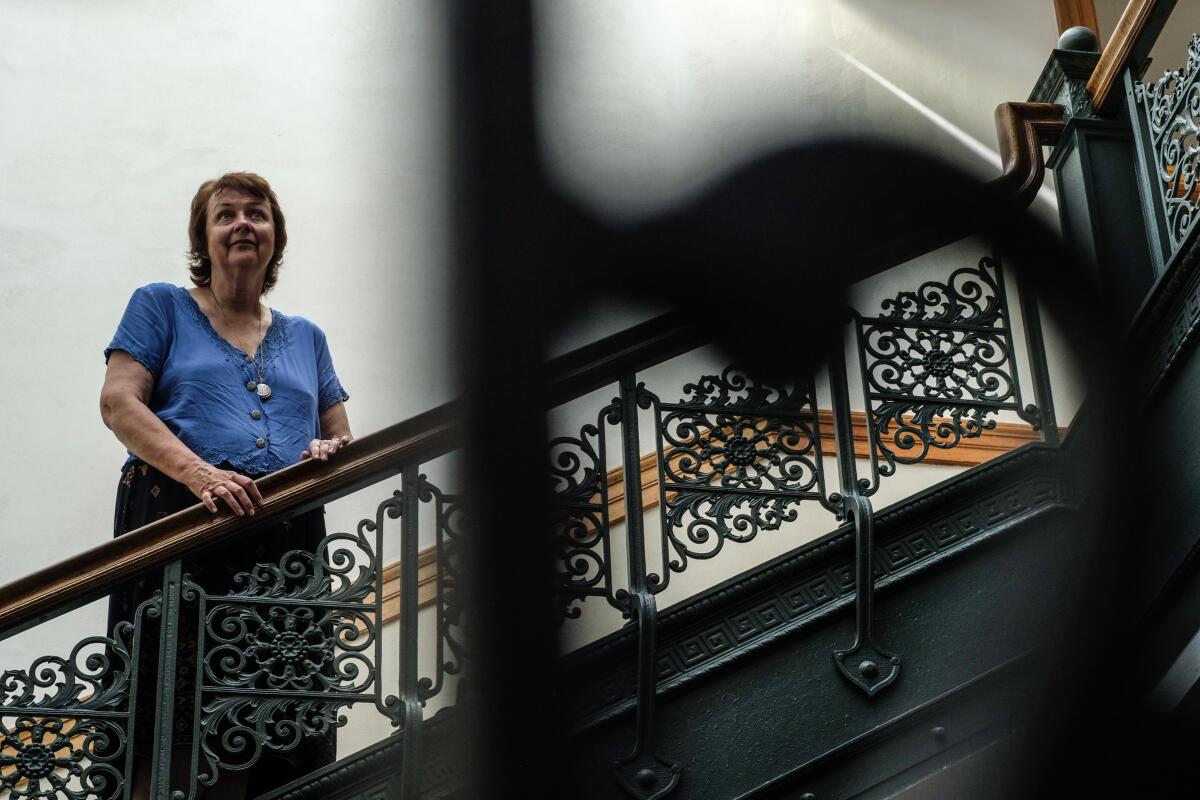
But the fundraising numbers echo the trend evident in polls — that Sanders’ 2016 supporters are not monolithically standing behind him this time around. Sanders and Massachusetts Sen. Elizabeth Warren are effectively tied in an average of recent polls, though Sanders’ numbers have been declining while Warren’s surge.
Warren, who occupies the same ideological lane as Sanders, has been the second-biggest beneficiary — with more than $5.2 million — from his 2016 donors.
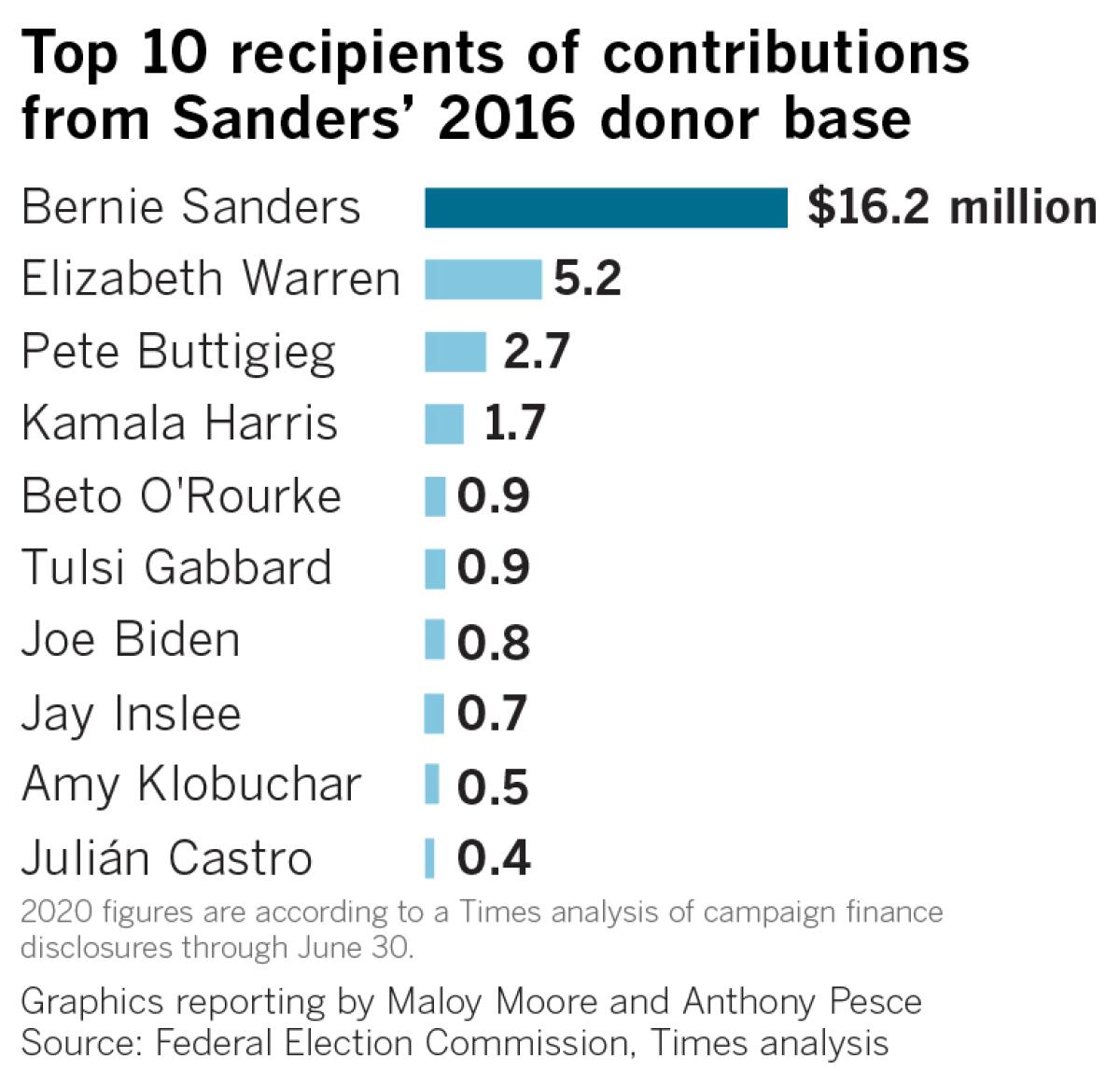
“I don’t want to say anything insulting to Bernie Sanders; I respect him. But Elizabeth Warren has plans, she has programs, she has an approach to every major issue,” said Los Angeles attorney Harry Rebhuhn, 65, who said he particularly appreciated Warren’s focus on monopolies and the havoc he believes they have wrought on America’s economy.
“I like Bernie. He’s got a heart of gold. … But I think Elizabeth Warren has greater plans for many other things, things that maybe Bernie never thought about.”
The Democratic primary offers progressive voters a choice between two heroes of the left, Sens. Bernie Sanders of Vermont and Elizabeth Warren of Massachusetts.
Warren’s ability to tap prior Sanders’ donors is a notable chunk of her fundraising — their dollars represent about a fifth of the money she has raised for her presidential campaign through June 30. Like Sanders, she has not held big-money fundraisers or spent hours every week dialing donors.
The Times was able to take an unprecedented, granular look look at Sanders’ historic donors because of his use of a fundraising tool called ActBlue, which is required by federal law to disclose all donors regardless of the size of their contributions. (The candidates’ official committees only have to identify donors who give more than $200.)
Sanders — who famously and repeatedly noted at nearly every campaign stop in 2016 that his average donation was $27 — was the only major Democratic candidate that election cycle to use ActBlue. Now, nearly all Democratic presidential candidates are using the fundraising tool, which, coupled with their candidate committees, allows a close examination of where Sanders’ army of donors has gone.
Of the more than 2 million identifiable donors who contributed a total of $232 million to Sanders’ 2016 run, a Times analysis found that more than 370,000, or 18%, have donated to a Democratic presidential candidate this cycle.
Some are spreading their money around to multiple candidates.
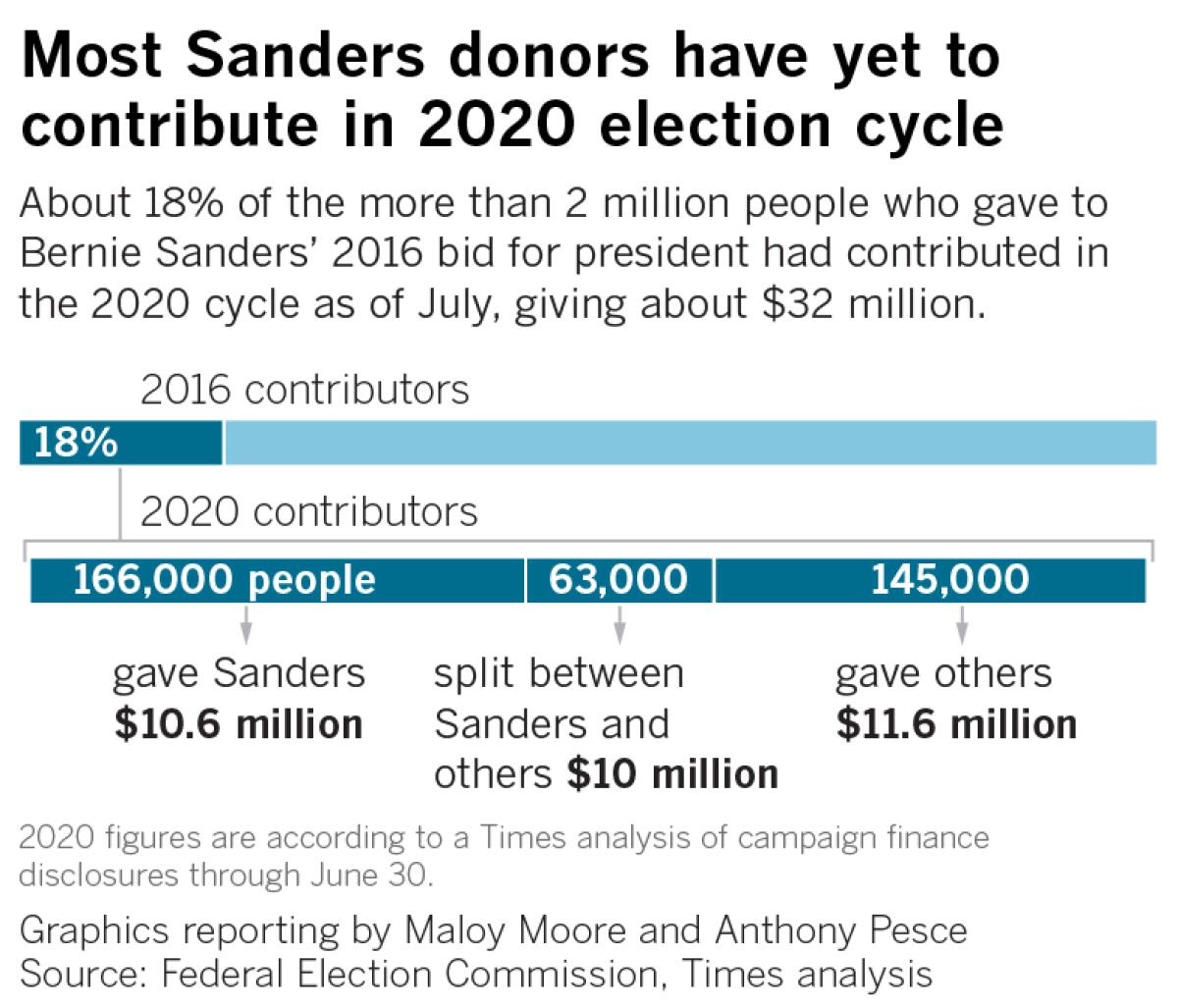
Tieger, who lives near the Los Angeles County Museum of Art, has donated $736 to seven candidates so far. She said she sent small checks to candidates including New York Sen. Kirsten Gillibrand and former Obama Cabinet member Julián Castro to help them make the stage in the June Democratic debate. The Democratic National Committee required that candidates garner a minimum of 65,000 individual donors as one path to qualifying for that first debate.
“That was in the beginning, to get them at least to the debates,” said the former schoolteacher and administrator. “I thought: ‘Let’s give a little bit here and there.’ ”
But now, Tieger is donating only to Warren — her first choice — and New Jersey Sen. Cory Booker.
Warren is “the most intelligent; I think she has the best plan. I think her working-class background enables her to have tremendous empathy,” Tieger said. “Booker — I think he’s kind. I know he’s intelligent. I think he can bring some compassion to the position.”
Although Tieger still adores Sanders’ policies, she said, she thinks Democrats need a fresher face to take on Trump.
“His time has passed,” Tieger said. “I think Warren is a better progressive candidate.”
The notion that Sanders needed to make room for a new generation of candidates was a common refrain among those who supported rivals like South Bend, Ind., Mayor Pete Buttigieg, who received more than $2.7 million from former Sanders donors, and California Sen. Kamala Harris, who got more than $1.7 million.
“No more old white men please,” said Marsha Carpenter, a retiree who lives in Lyndhurst, Ohio.
The 78-year-old donated $2,295 to Harris in a series of 26 donations this year after meeting her at a Cleveland event, reading her book and watching her debate performance in June, when she lacerated former Vice President Joe Biden on his prior views on school busing.
“I like that she has guts. It’s going to take someone with guts,” said Carpenter, a retired claims underwriter. “I wish a woman could be president before I die.”
Still Carpenter, like other Democratic donors interviewed for this article, said she would gladly support the eventual nominee, whoever it is. It’s a shift from the last two open Democratic primaries, in 2008 and 2016, when some backers of defeated candidates struggled or refused to support the party’s standard-bearer in the general election.
This goodwill could evaporate as the primary competition inevitably gets more heated. But for now, Democratic supporters of various candidates vowed to put their differences aside and work together during the general election to defeat Trump.
“I don’t care if it’s Bugs Bunny who is purple standing on his head...,” Carpenter said. “As long as it’s a Democrat, I’ll vote for them.”
More to Read
Get the L.A. Times Politics newsletter
Deeply reported insights into legislation, politics and policy from Sacramento, Washington and beyond. In your inbox twice per week.
You may occasionally receive promotional content from the Los Angeles Times.
